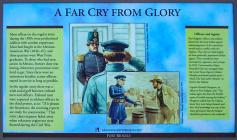Inscription
A FAR CRY FROM GLORY
Most officers in the regular army during the 1850s were professional soldiers with combat experience. Most had fought in the Mexican-American War (1846-47), and three quarters were West Point graduates. To those who had seen action in Mexico, frontier duty was boring. Moreover, promotions were hard to get. Since there were no retirement benefits, senior officers stayed in service as long as possible.
In the regular army there was a wide social gulf between enlisted men and officers. Enlisted men were expected to address officers in the third person, as in: "If it pleases the lieutenant, the morning reports are ready for examination." This strict class etiquette faded away when volunteer regiments were formed during the Civil War.
Fort Ridgely's officers and soldiers feared that the local Indian agents' mismanagement of the reservation would lead to conflict with the Dakota. They did not think highly of these politically appointed civilian agents. They considered them incompetent, ignorant, and corrupt. In 1855, Commandant Major Hannibal Day was outraged when the Lower Sioux Agency's Robert Murphy purchased spoiled pork—which Day had earlier refused—to feed to the Dakota.
Captain Richard Musgrove, an officer at Fort Ridgely, said, "The Indian agent has been the fruitful cause of trouble among the Indians." Musgrove added that the Dakota knew they were being cheated, and that "this knowledge was one of the many grievances that the Indians cherished, previous to the outbreak."
Fort Ridgely
Details
| HM Number | HM1D0U |
|---|---|
| Series | This marker is part of the Minnesota Historical Society series, and the Minnesota: Fort Ridgely Interpretive Series series. |
| Tags | |
| Historical Period | 19th Century |
| Historical Place | Battlefield, Fort, Military Installation, Monument, Park |
| Marker Type | Other |
| Marker Class | Neither |
| Marker Style | Free Standing |
| Placed By | Minnesota Historical Society |
| Marker Condition | No reports yet |
| Date Added | Thursday, September 18th, 2014 at 1:13pm PDT -07:00 |
Pictures
Photo Credits: [1] MARTHA DECKER [2] MARTHA DECKER
Locationbig map
| UTM (WGS84 Datum) | 15T E 362041 N 4923622 |
|---|---|
| Decimal Degrees | 44.45275000, -94.73396667 |
| Degrees and Decimal Minutes | N 44° 27.165', W 94° 44.038' |
| Degrees, Minutes and Seconds | 44° 27' 9.9000" N, 94° 44' 2.2800" W |
| Driving Directions | Google Maps |
| Area Code(s) | 507 |
| Can be seen from road? | Yes |
| Is marker in the median? | No |
| Which side of the road? | Marker is on the right when traveling West |
| Closest Postal Address | At or near 1344-1398 Co Hwy 30, Fairfax MN 55332, US |
| Alternative Maps | Google Maps, MapQuest, Bing Maps, Yahoo Maps, MSR Maps, OpenCycleMap, MyTopo Maps, OpenStreetMap |
Is this marker missing? Are the coordinates wrong? Do you have additional information that you would like to share with us? If so, check in.
Nearby Markersshow on map
Show me all markers in: Fairfax, MN | Nicollet County | 55332 | Minnesota | United States of America
Maintenance Issues
- This marker could use another picture or two.


Comments 0 comments